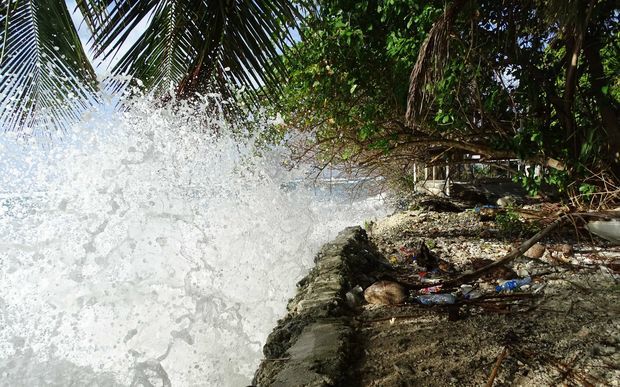Related News

Pacific people are calling for more influence on global issues that affect the region’s changing climate.
The call was a common feature among delegates speaking at the Pacific Climate Change Conference in New Zealand last week, where scientists confirmed the Pacific is facing faster and more extreme change than other parts of the planet.
Dominic Godfrey was there.
Several hundred climate experts from international governments and non-government organisations gathered in Wellington for the climate summit.
In his opening speech, Samoa’s prime minister reinforced the risk climate change poses to “the very survival of our island homes”.
Tuila’epa Sa’ilele Malielegaoi called for continued and urgent negotiations for enforceable action on climate change, saying the momentum built through the Paris Agreement needs to be maintained.
“Keeping global temperature increases below 1.5 degrees Celsius is not a choice but an absolute necessity.”
Tuila’epa also called on Pacific people to play their part and cited Samoa’s target of generating 100 percent renewable electricity by 2025.
“We can reduce other local stresses such as destructive fishing and reduce land based sources of pollution. We must see our mangroves and our wetlands as our carbon allies as they take up carbon dioxide and store it in their biomass and soils.”
Adaptation and resilience strategies were also a feature.
The donor supported Pacific Catastrophe Risk Insurance Company was set-up to help Pacific countries plan for and insure against disaster.
The Cook Islands based company had just paid US$3.5-million to Tonga for rapid response against Cyclone Gita – its first major pay-out after being established last year.
The company’s chief executive David Traill said the company allows Pacific governments to be pro-active in times of disaster.
“A lot of the technical assistance work is actually working with both the disaster risk management teams and also the ministries of finance around their planning for events like this. So, what would you do in the case so that when it does happen we can release funds and they’re also able to act on them as quickly as possible?”
Mr Traill said the Cook Islands, Marshall Islands, Samoa, Tonga and Vanuatu currently pay about 30 percent of the total insurance premium with support from donor nations and the World Bank.
From Hawai’i there were calls for indigenous voices to be heard on climate change.
The director of the Native Hawaiian Law Centre Kapua Sproat spoke of the potential for domestic laws enshrined in the US constitution.
“These are increasingly important in the Trump era that we in the US are now dealing with. One significant general approach in dealing with the issue of cultural survival is rooted in an indigenous people’s right to environmental self-determination which now in Hawai’i at least is tied to the state legal regimes regarding the protection of natural resources and native culture.”
She said this was based on human rights law rather than sovereignty which in turn is a challenge for some independent Pacific countries.
The governor of Papua New Guinea’s Oro Province Gary Juffa spoke of the difficulty PNG people have with their rights being represented in parliament whether from government or opposition.
“Because often-times the opposition’s just the flip-side of the government, they’d be doing exactly the same thing as those guys if they were given the chance. And if you follow the strings behind their backs you’ll find some powerful trans-national corporations that actually control them, fund them and have them do their bidding.”
The founder of Blue Ocean Law in Guam is working with communities in Papua New Guinea, Fiji and Tonga who are facing the prospect of deep sea mineral extraction.
Julian Aguon said seabed mining’s impact on biodiversity along with climate change and the rights of indigenous people is little understood.
“In PNG, where experimental DSM is already underway with the Canadian company Nautilus Minerals off the New Ireland coast, villagers have already reported high incidences of dead fish washing up on shore including strange deep sea creatures that are not familiar to anyone and are actually hot to the touch.”
Mr Aguon argued the international legal position largely ignores environmental safeguards like the Precautionary Principle and Transboundary Harm – where unknown risks to the environment or neighbours outweighs potential economic benefit.
He said indigenous rights were trampled when Free and Prior Informed Consent – a legal mechanism designed to engage native peoples – was ignored.
The University of the South Pacific’s director of the Pacific Center for Environment and Sustainable Development Elisabeth Holland called for Pacific led research by the Pacific, for the Pacific.
“Pacific researchers can do a more effective job of making sure that their research is actually published in peer reviewed literature. They can partner with institutions like the University of Victoria that will engage in true partnerships, not colonial partnerships.”
Dr Holland spoke of the Pacific having reached the UN Framework Convention on Climate Change’s article 2 crisis point, where dangerous human induced climatic interference has occurred.
She called on the global community to listen to those in the Pacific at the forefront of climate change who were offering solutions and calling for action.
Samoa’s Prime Minister Tuila’epa reflected the same sentiment when he closed his address with words from his Tuvalu counterpart Enele Sopoaga, “If we save Tuvalu, we save the world.”